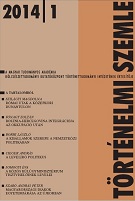Bosznia-Hercegovina integrációja az okkupáció után. Hatalompolitika és modernizáció a közös minisztertanácsi jegyzőkönyvek tükrében
The Integration of Bosnia-Herzegovina after the Occupation
Author(s): Zoltán FónagySubject(s): History
Published by: Magyar Tudományos Akadémia Bölcsészettudományi Kutatóközpont Történettudományi Intézet
Summary/Abstract: The occupation of Bosnia-Herzegovina in 1878 increased the population of the Austro-Hungarian Monarchy with a mere 3 per cent. Although the government of the multi-ethnic and multi-confessional empire boasted an immense routine of handling heterogeneity, the bureaucracy of this Christian European state faced a new challenge in that it was now a Slavic-speaking Muslim community with a massive territorial identity that they were forced to integrate, a community, moreover, the lifestyle and traditions of which, based on the values of the East, widely diverged from those of their own society. The present study examines the first years of the integration, and primarily focusses on the phenomenon of the „encounter of cultures”. It analyses the conflicts between the state bureaucracy, which pursued its own aims of modernisation and homogenization, and a heterogeneous and traditional society from the aspect of historical anthropology. It reconstructs and interprets the Bosnia-picture of the West with the help of categories borrowed from the orientalism conception of Edward W. Said. It surveys the major problems of modernisation in this West-Balkan province: the establishment of a bureaucratic state structure, the agrarian question (i.e., the ordered suppression of feudalism), the problem of education and the settlement of the relationship between the Muslim confession and the state. It seeks an explanation for the tolerance and respect for the local peculiarities which characterised the administration of the Monarchy during the integration and modernisation of Bosnia, a rare exception in the age of colonialism. Although the reasons for tolerance and prudence are chiefl y identified in the sphere of power politics, it reveals also the influences of a long tradition of heterogeneity and enlightened absolutism in the Monarchy. Great attention is paid to the conservative social ideas of Béni Kállay, common minister of finances, who governed Bosnia for two decades, and to the attempt of creating a Bosnian nation in the Western sense of the word. The cultural missionary zeal which pervaded the bureaucracy of the Central-European empire and the characteristic Hungarian orientalism are likewise touched upon. The study mainly relies on archival and printed documents produced by the political and administrative organs of the dualist Monarchy, and makes especially great use of the minutes of the sessions of the common Council of Ministers in the years after the occupation.
Journal: Történelmi Szemle
- Issue Year: 2014
- Issue No: 01
- Page Range: 27-60
- Page Count: 34
- Language: Hungarian

